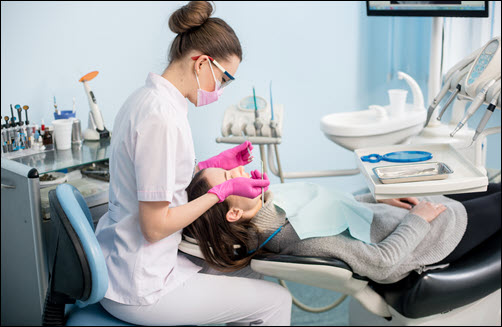Dental Hygienists Thrive with Progressive Dental Concepts: Top Pay, Benefits, and Experience
Working under the Progressive Dental Concepts (PDC) umbrella, dental hygienists gain more than just a job. They build rewarding careers with top-tier pay, exceptional benefits, and opportunities for professional growth. PDC prioritizes the success and well-being of its dental hygienists. This creates an environment where they can thrive while delivering outstanding patient care. With hands-on experience, desirable incentives, and a supportive community, hygienists working for PDC practices find that they’re part of a network dedicated to their success.
Competitive Pay and Desirable Benefits
PDC understands that competitive pay is essential to attracting and retaining skilled dental hygienists. PDC offers top pay rates to its team. It also recognizes and rewards them for their expertise and hard work. This financial stability allows hygienists to focus on their professional goals and patient care. It removes the stress of finding fair compensation.
In addition to excellent pay, PDC provides a benefits package designed to support both personal and professional well-being. Benefits include health insurance, retirement plans, paid time off, and continuing education opportunities. This commitment to comprehensive benefits shows PDC’s dedication to creating a balanced and sustainable work environment, helping hygienists feel valued and supported in every aspect of their lives.
Real-World Experience with Advanced Techniques
 Working within a PDC practice, dental hygienists gain hands-on experience with the latest dental technology and advanced techniques. PDC encourages continuous learning, giving hygienists access to cutting-edge equipment and training in modern procedures that keep them at the forefront of the field. This exposure allows them to enhance their skills, improve patient outcomes, and expand their professional expertise.
Working within a PDC practice, dental hygienists gain hands-on experience with the latest dental technology and advanced techniques. PDC encourages continuous learning, giving hygienists access to cutting-edge equipment and training in modern procedures that keep them at the forefront of the field. This exposure allows them to enhance their skills, improve patient outcomes, and expand their professional expertise.
With mentorship and guidance from experienced practitioners, PDC’s hygienists build confidence and sharpen their clinical abilities, making them well-prepared for a successful, long-lasting career in dental hygiene.
Incentives for Performance and Growth
PDC recognizes and rewards high-performing dental hygienists through a variety of incentives. Performance bonuses, advancement opportunities, and regular recognition initiatives motivate hygienists to continue providing top-quality care. These incentives encourage excellence, helping team members feel appreciated and connected to the success of their practice.
A Supportive Team Environment
PDC practices foster a collaborative, positive work culture that values each hygienist’s contributions. Dental hygienists find themselves part of a supportive team, surrounded by professionals who are equally dedicated to quality care and professional growth.
With Progressive Dental Concepts, dental hygienists enjoy desirable pay, benefits, and the chance to grow in their field. Joining the PDC family opens doors to a fulfilling career path where passion for dental care meets real-world support and recognition.



 Access to Advanced Technology and Resources
Access to Advanced Technology and Resources
 Second: Pursue the Necessary Education
Second: Pursue the Necessary Education